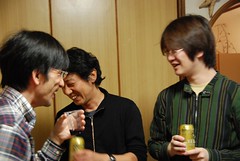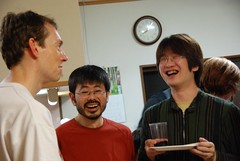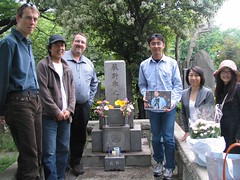Contributed by merdely on from the remembering-a-friend dept.
Mark Uemura (mtu@) returns the 6th part of his series from the Network Hackathon in Japan:
|
Network Hackathon (Part 6) - May 5-10, 2008, Ito, Japan We were expecting a bit more participation from Japanese developers at the hackathon. Unfortunately, the timing of the event was just after Golden Week which is when the whole country takes a week long holiday to spend with their families. Despite this, we were blessed with what seemed to be la crème de la crème of Japanese developers. Their time with us was short but fruitful in many ways. |
 |
Part 6 continues below with interviews, more pictures and a special remembrance of Itojun.
Kenjiro Cho (kjc@) has been one of the main Japanese kernel developers for OpenBSD. In fact, everyone who uses altq(9), the packet scheduler framework in OpenBSD, has him to thank. He is a prominent member of the WIDE Project and a senior researcher at Internet Initiative Japan (IIJ).
Kenjiro-san has done a lot of research on Internet traffic analysis. It helps that he is working at one of the largest ISPs in Japan. Back in 2005, I remember him mentioning that 80% of the Japanese backbone traffic was used by about 10% of the users. They believed it was mainly P2P file-sharing. More recently, he said that the P2P traffic seems to have stopped growing and that Youtube and similar service traffic has been rapidly growing since 2006.
You would think that since Japan has one of the highest number of Internet connections in the world per capita that there would be a need for traffic shaping of some sort. However, five years ago, the fastest line that I could get to my home was a 24 Mbps xDSL line. Less than a year later, we were seeing 50 Mbps and now it is not uncommon to have 100 Mbps fibre right into the homes. I still have that 24 Mbps line but I also have two 100 Mbps fibre lines as well :-)
I think it was Kenjiro-san that told me that all of the Internet lines are above ground along with the power lines and the big Japanese telcos upgrade their lines on a five year schedule. It is no wonder that within a span of ten years, this country went from primarily dial-up 56K modems for Internet connectivity to 100 Mbps fibre lines.
Here is what Kenjiro-san had to say about his work at the hackathon:
I was investigating the impact of the recent if_start() change to the altq performance. The change is intended to reduce the number of ifp->if_start() calls, which means fewer chances to control packets for altq. For packets originating from the host, it doesn't have an impact since ifp->if_start() will be called immediately after splx(). But it does have an impact when ifp->if_start() is called in the interrupt context, for example, in the packet receive interrupt. There are trade-offs: altq can control packets less frequently but does a better job when more packets are in the queue. My conclusion is that the overall performance of altq isn't affected much by the change.
Yojiro Uo (yuo@), also from IIJ, has spent quite some time working on WiFi and USB devices but is also a core member of the Ayame project, an MPLS implementation for the next generation core-Internet. His presence at the hackathon was very apropos and shortly thereafter he received his account as an OpenBSD developer.
Yojiro-san brought his wife, Ayako, to the hackathon. Ayako-san impressed many with her knowledge and understanding of BSD. The two of them spent a couple nights sharing their culture and many bottles of sake with the Europeans. Needless to say, the evenings were filled with laughter, cheer and unforgettable moments. Now, I can't imagine having a hackathon or party without her :-)
Yojiro-san came into the Project at an interesting time. Whilst home Internet connectivity was sky-rocketing, we were also seeing more and more high-speed Internet modems in all kinds of form factors for the really mobile. When I was living in Europe over five years ago, I was happier than a pig in mud to have a UMTS/3G phone which at the time gave me a whopping 384 Kbps almost anywhere in the EU. Then I moved to Japan and had to settle for only 128 Kbps with latency anywhere around 300 to 600 ms. That was really disappointing especially when using SSH. Then, about two years ago, we started seeing high-speed modem cards that offered 3.6 Mbps and then, a year later, 7.2 Mbps speeds. All at a flat rate of $60 a month with unlimited usage. Yojiro-san recently added support for many of these cards in OpenBSD. All I can say is, "Happy times again!"
Here is what Yojiro-san had to say about his short time at the hackathon:
As the camp was my first experiment to hack on OpenBSD, I had to spend half a day to setup my development environment.
At n2k8, I started to add wireless high-speed (3G/HSDPA) modems to OpenBSD's umsm(4) driver. Some 3G modems have usb mass storage mode to install device driver to the host PC (normally called "Zero-CD" function). However, without any special operation, its modem function is not enabled. I added a tiny function to issue "mode-change-request" when the device is in usb mass storage mode. I also added some functions to umsm(4) to handle interrupt endpoint to increase responsiveness. After all this, I finally got some high-speed modem devices to work well in -current.
For the past two weeks since the hackathon, I have been working on the umsm(4) driver to support other modems. I have since received a report from a European OpenBSD developer about another high-speed modem that works fine with my new patch. This device is Option's (OEM to Vodafone) GlobeSurfer USB Modem. It needs different logic than the E220 to enable its modem functionality.
Kenjiro-san also invited another colleague from IIJ, Keiichi Shima. Keiichi-san specialises in Mobile IPv6 and is a co-author of IPv6 Core Protocols Implementation and IPv6 Advanced Protocols Implementation. These books were written in a similar style and approach as the TCP/IP Illustrated books written by W. Richard Stevens and Gary R. Wright. One might say that they are the IPv6 equivalent of those written by Stevens and Wright. I highly recommend these books to anyone wanting to learn invaluable insights into the internals of IPv6 networking based on the KAME IPv6 implementation.
Shima-san's time with us was very short but worthwhile as he got to know many OpenBSD developers and understand the OpenBSD way. He told me that the atmosphere at the hackathon was very unique and special. He enjoyed his time with us there. I know that he had some good discussions with Ryan McBride (mcbride@) and others at the hackathon and again at the party at the end of the week. We were definitively privileged to have him with us and we look forward to seeing more of him in the future.
Yet, however successful the Network Hackathon was, it was missing one of the biggest reasons that we decided to host it in the first place. Kenjiro-san was also a close personal friend to Itojun-san (itojun@). In fact, Itojun was a great friend to many, a mentor to the world and one of the only Japanese developers that really understood what OpenBSD was all about. I remember Theo saying, "He got it. He understood it." referring to security.
About a week after the hackathon, the remaining few went to pay tribute to Itojun at his final resting place. Tatuya Jinmei, Itojun's close friend and also co-author of the same IPv6 books mentioned above, also came with us. His mother joined us and went out of her way to make us Itojun's favourite desert: home made chocolate cake with fresh whipped cream on top. This was a special time for all of us there.
(n2k8 hackathon summary to be continued)
Again, I'd like to thank Mark for sharing more of his account of n2k8.
(Comments are closed)







By Anonymous Coward (193.238.134.2) on
Comments
By r3ba openbsd user from russia (i'm not a coward :) (193.238.134.2) r3ba@i-nk.ru on
By r3ba openbsd user from russia (i'm not a coward :) (193.238.134.2) r3ba@i-nk.ru on
By Anonymous Coward (212.20.215.132) on
By J.C. Roberts (jcr) jcroberts@designtools.org on http:www.designtools.org
I just wanted to say thanks to all of you for the time taken to put together these articles. They were fanastic (of course, with the sole exception of the stinky cheese :-).
It was great to see what's going on, both in the devlopers own words as well as excellent naration Mark provided.
--
jcr
By Anonymous Coward (92.80.34.74) on
Comments
By Julien Mabillard (194.209.134.34) on
Right. These articles are just great both to learn about some
japanese things and about the logic of evolution in the code.
The comments about internals and ways of improving code are very
interesting and will just attract more developers into contributing
to this great project.
Comments
By Anonymous Coward (24.37.242.64) on
> Right. These articles are just great both to learn about some
> japanese things and about the logic of evolution in the code.
> The comments about internals and ways of improving code are very
> interesting and will just attract more developers into contributing
> to this great project.
I agree with you. It's also interesting to be able to put some faces to names that you see elsewhere as well.
Always nice to hear of more developers joining in.
By hust888 (221.232.153.107) on
Does OBSD support Intel's I/OAT tech?
I found OBSD support "Intel 5000P Host" in 4.3, and FreeBSD has a patch for it, pls refer to: http://sourceforge.net/project/showfiles.php?group_id=42302
Comments
By Anonymous Coward (128.171.90.200) on
> Does OBSD support Intel's I/OAT tech?
> I found OBSD support "Intel 5000P Host" in 4.3, and FreeBSD has a patch for it, pls refer to: http://sourceforge.net/project/showfiles.php?group_id=42302
ixgb ?
http://www.openbsd.org/cgi-bin/man.cgi?query=ixgb&arch=amd64&sektion=4
By Anonymous Coward (2a01:348:108:155:20a:e4ff:fe2d:99ee) on
> Does OBSD support Intel's I/OAT tech?
No.
By Anonymous Coward (208.75.91.18) hust888 on
Does OBSD support Intel's I/OAT tech?
I found OBSD support "Intel 5000P Host" in 4.3, and FreeBSD has a patch for it, pls refer to: http://sourceforge.net/project/showfiles.php?group_id=42302